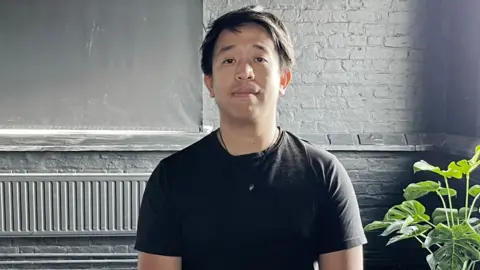 BBC
BBCIt was 2022 and Cai, then 16, was scrolling on his telephone. He says one of many first movies he noticed on his social media feeds was of a cute canine. However then, all of it took a flip.
He says “out of nowhere” he was beneficial movies of somebody being hit by a automobile, a monologue from an influencer sharing misogynistic views, and clips of violent fights. He discovered himself asking – why me?
Over in Dublin, Andrew Kaung was working as an analyst on consumer security at TikTok, a task he held for 19 months from December 2020 to June 2022.
He says he and a colleague determined to look at what customers within the UK have been being beneficial by the app’s algorithms, together with some 16-year-olds. Not lengthy earlier than, he had labored for rival firm Meta, which owns Instagram – one other of the websites Cai makes use of.
When Andrew regarded on the TikTok content material, he was alarmed to seek out how some teenage boys have been being proven posts that includes violence and pornography, and selling misogynistic views, he tells BBC Panorama. He says, typically, teenage women have been beneficial very completely different content material primarily based on their pursuits.
TikTok and different social media firms use AI instruments to take away the overwhelming majority of dangerous content material and to flag different content material for evaluate by human moderators, whatever the variety of views they’ve had. However the AI instruments can not establish all the things.
Andrew Kaung says that throughout the time he labored at TikTok, all movies that weren’t eliminated or flagged to human moderators by AI – or reported by different customers to moderators – would solely then be reviewed once more manually in the event that they reached a sure threshold.
He says at one level this was set to 10,000 views or extra. He feared this meant some youthful customers have been being uncovered to dangerous movies. Most main social media firms enable individuals aged 13 or above to enroll.
TikTok says 99% of content material it removes for violating its guidelines is taken down by AI or human moderators earlier than it reaches 10,000 views. It additionally says it undertakes proactive investigations on movies with fewer than this variety of views.

When he labored at Meta between 2019 and December 2020, Andrew Kaung says there was a distinct downside. He says that, whereas the vast majority of movies have been eliminated or flagged to moderators by AI instruments, the location relied on customers to report different movies as soon as they’d already seen them.
He says he raised issues whereas at each firms, however was met primarily with inaction as a result of, he says, of fears in regards to the quantity of labor concerned or the associated fee. He says subsequently some enhancements have been made at TikTok and Meta, however he says youthful customers, corresponding to Cai, have been left in danger within the meantime.
A number of former staff from the social media firms have instructed the BBC Andrew Kaung’s issues have been per their very own information and expertise.
Algorithms from all the key social media firms have been recommending dangerous content material to kids, even when unintentionally, UK regulator Ofcom tells the BBC.
“Firms have been turning a blind eye and have been treating kids as they deal with adults,” says Almudena Lara, Ofcom’s on-line security coverage growth director.
‘My pal wanted a actuality verify’
TikTok instructed the BBC it has “industry-leading” security settings for teenagers and employs greater than 40,000 individuals working to maintain customers secure. It mentioned this 12 months alone it expects to take a position “greater than $2bn (£1.5bn) on security”, and of the content material it removes for breaking its guidelines it finds 98% proactively.
Meta, which owns Instagram and Fb, says it has greater than 50 completely different instruments, assets and options to present teenagers “constructive and age-appropriate experiences”.
Cai instructed the BBC he tried to make use of considered one of Instagram’s instruments and the same one on TikTok to say he was not keen on violent or misogynistic content material – however he says he continued to be beneficial it.
He’s keen on UFC – the Final Combating Championship. He additionally discovered himself watching movies from controversial influencers once they have been despatched his means, however he says he didn’t wish to be beneficial this extra excessive content material.
“You get the image in your head and you’ll’t get it out. [It] stains your mind. And so you consider it for the remainder of the day,” he says.
Ladies he is aware of who’re the identical age have been beneficial movies about matters corresponding to music and make-up fairly than violence, he says.

In the meantime Cai, now 18, says he’s nonetheless being pushed violent and misogynistic content material on each Instagram and TikTok.
After we scroll via his Instagram Reels, they embrace a picture making mild of home violence. It exhibits two characters aspect by aspect, considered one of whom has bruises, with the caption: “My Love Language”. One other exhibits an individual being run over by a lorry.
Cai says he has seen that movies with hundreds of thousands of likes could be persuasive to different younger males his age.
For instance, he says considered one of his mates grew to become drawn into content material from a controversial influencer – and began to undertake misogynistic views.
His pal “took it too far”, Cai says. “He began saying issues about ladies. It’s like it’s important to give your pal a actuality verify.”
Cai says he has commented on posts to say that he doesn’t like them, and when he has by accident favored movies, he has tried to undo it, hoping it is going to reset the algorithms. However he says he has ended up with extra movies taking up his feeds.

So, how do TikTok’s algorithms really work?
In response to Andrew Kaung, the algorithms’ gasoline is engagement, no matter whether or not the engagement is constructive or detrimental. That might clarify partially why Cai’s efforts to govern the algorithms weren’t working.
Step one for customers is to specify some likes and pursuits once they enroll. Andrew says among the content material initially served up by the algorithms to, say, a 16-year-old, is predicated on the preferences they offer and the preferences of different customers of the same age in the same location.
In response to TikTok, the algorithms should not knowledgeable by a consumer’s gender. However Andrew says the pursuits youngsters categorical once they enroll usually have the impact of dividing them up alongside gender traces.
The previous TikTok worker says some 16-year-old boys may very well be uncovered to violent content material “immediately”, as a result of different teenage customers with related preferences have expressed an curiosity in any such content material – even when that simply means spending extra time on a video that grabs their consideration for that little bit longer.
The pursuits indicated by many teenage women in profiles he examined – “pop singers, songs, make-up” – meant they weren’t beneficial this violent content material, he says.
He says the algorithms use “reinforcement studying” – a technique the place AI programs study by trial and error – and prepare themselves to detect behaviour in direction of completely different movies.
Andrew Kaung says they’re designed to maximise engagement by exhibiting you movies they count on you to spend longer watching, touch upon, or like – all to maintain you coming again for extra.
The algorithm recommending content material to TikTok’s “For You Web page”, he says, doesn’t all the time differentiate between dangerous and non-harmful content material.
In response to Andrew, one of many issues he recognized when he labored at TikTok was that the groups concerned in coaching and coding that algorithm didn’t all the time know the precise nature of the movies it was recommending.
“They see the variety of viewers, the age, the pattern, that form of very summary information. They would not essentially be really uncovered to the content material,” the previous TikTok analyst tells me.
That was why, in 2022, he and a colleague determined to try what sorts of movies have been being beneficial to a variety of customers, together with some 16-year-olds.
He says they have been involved about violent and dangerous content material being served to some youngsters, and proposed to TikTok that it ought to replace its moderation system.
They needed TikTok to obviously label movies so everybody working there might see why they have been dangerous – excessive violence, abuse, pornography and so forth – and to rent extra moderators who specialised in these completely different areas. Andrew says their solutions have been rejected at the moment.
TikTok says it had specialist moderators on the time and, because the platform has grown, it has continued to rent extra. It additionally mentioned it separated out several types of dangerous content material – into what it calls queues – for moderators.

Panorama: Can We Reside With out Our Telephones?
What occurs when smartphones are taken away from children for every week? With the assistance of two households and many distant cameras, Panorama finds out. And with requires smartphones to be banned for kids, Marianna Spring speaks to oldsters, youngsters and social media firm insiders to research whether or not the content material pushed to their feeds is harming them.
Watch on Monday on BBC One at 20:00 BST (20:30 in Scotland) or on BBC iPlayer (UK solely)
‘Asking a tiger to not eat you’
Andrew Kaung says that from the within of TikTok and Meta it felt actually tough to make the adjustments he thought have been mandatory.
“We’re asking a personal firm whose curiosity is to advertise their merchandise to average themselves, which is like asking a tiger to not eat you,” he says.
He additionally says he thinks kids’s and youngsters’ lives could be higher in the event that they stopped utilizing their smartphones.
However for Cai, banning telephones or social media for youngsters is just not the answer. His telephone is integral to his life – a very essential means of chatting to mates, navigating when he’s out and about, and paying for stuff.
As an alternative, he needs the social media firms to hear extra to what youngsters don’t wish to see. He needs the companies to make the instruments that permit customers point out their preferences more practical.
“I really feel like social media firms do not respect your opinion, so long as it makes them cash,” Cai tells me.
Within the UK, a brand new legislation will pressure social media companies to confirm kids’s ages and cease the websites recommending porn or different dangerous content material to younger individuals. UK media regulator Ofcom is accountable for imposing it.
Almudena Lara, Ofcom’s on-line security coverage growth director, says that whereas dangerous content material that predominantly impacts younger ladies – corresponding to movies selling consuming issues and self-harm – have rightly been within the highlight, the algorithmic pathways driving hate and violence to primarily teenage boys and younger males have acquired much less consideration.
“It tends to be a minority of [children] that get uncovered to probably the most dangerous content material. However we all know, nevertheless, that after you might be uncovered to that dangerous content material, it turns into unavoidable,” says Ms Lara.
Ofcom says it could superb firms and will carry felony prosecutions if they don’t do sufficient, however the measures won’t are available in to pressure till 2025.
TikTok says it makes use of “progressive expertise” and gives “industry-leading” security and privateness settings for teenagers, together with programs to dam content material that might not be appropriate, and that it doesn’t enable excessive violence or misogyny.
Meta, which owns Instagram and Fb, says it has greater than “50 completely different instruments, assets and options” to present teenagers “constructive and age-appropriate experiences”. In response to Meta, it seeks suggestions from its personal groups and potential coverage adjustments undergo strong course of.




